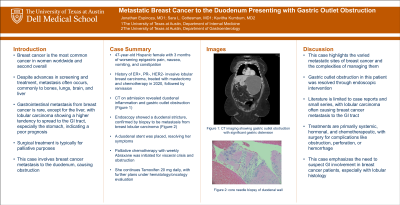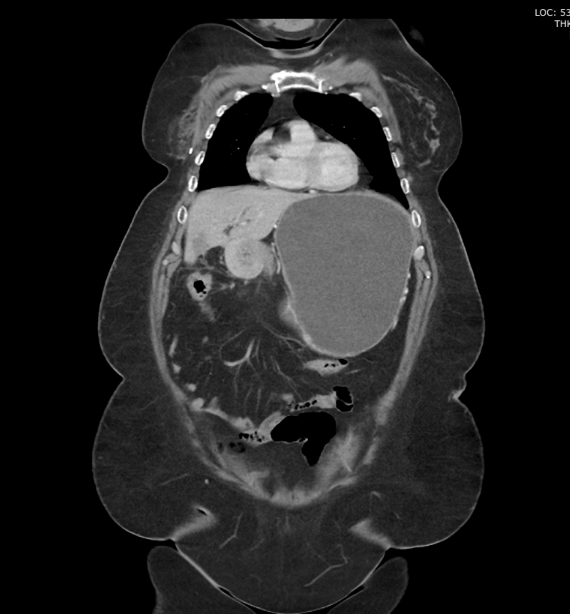Monday Poster Session
Category: Colon
P1995 - Metastatic Breast Cancer to the Duodenum Presenting With Gastric Outlet Obstruction.
Monday, October 28, 2024
10:30 AM - 4:00 PM ET
Location: Exhibit Hall E

Has Audio

Jonathan Espinoza, MD
University of Texas at Austin Dell Medical School
Austin, TX
Presenting Author(s)
Jonathan Espinoza, MD, Sara Gottesman, MD, Kavitha Kumbum, MD
University of Texas at Austin Dell Medical School, Austin, TX
Introduction: Breast cancer is the most prevalent cancer in women globally (1) and the second-most prevalent cancer overall (2). Despite widespread mammogram screening and treatment options, the disease often leads to metastasis, most commonly to the bones, lungs, brain, and liver (3). Gastrointestinal tract metastasis from primary breast cancer is rare overall, excluding to the liver (4), with lobular carcinoma showing a higher tendency to spread to the GI tract, particularly the stomach, than other forms of breast cancer (5). Such metastasis generally indicates a poor prognosis. Surgical intervention is primarily aimed towards palliative purposes (6). This is a case of a woman with breast cancer metastasis to her duodenum, resulting in obstruction.
Case Description/Methods: A 47-year-old Hispanic female presented to the hospital with 3 months of worsening epigastric pain, nausea, vomiting, and constipation. Medical history includes ER positive, PR negative, HER2 negative invasive lobular breast carcinoma diagnosed in 2020 treated with mastectomy and chemotherapy with resulting remission. On admission, CT scans revealed duodenal inflammation and gastric outlet obstruction (Fig. 1). Subsequent endoscopy showed a duodenal stricture without an identifiable cause. Endoscopic ultrasound with biopsy confirmed metastatic disease from primary breast lobular carcinoma. A duodenal stent was placed to alleviate gastric outlet obstruction with eventual resolution of her symptoms. Hematology/oncology started her on palliative chemotherapy with weekly Abraxane due to visceral crisis and duodenal obstruction. She will continue Tamoxifen 20 mg daily. Further plans pending ongoing hematology/oncology evaluation.
Discussion: This case underscores the variable sites where breast cancer can metastasize and the challenges of managing these metastases. In our patient's case, we resolved the gastric outlet obstruction caused by the metastasis through endoscopic intervention. Current literature is limited to single case reports or small series, though most report a high proportion of primary lobular carcinoma causing metastatic breast cancer to the GI tract (7). Treatments are primarily systemic, hormonal, and chemotherapeutic, with surgical interventions indicated for complications including obstruction, perforation, and hemorrhage (8). This case serves as a reminder to suspect GI tract involvement in patients with a history of breast carcinoma, particularly with lobular histologic features.

Disclosures:
Jonathan Espinoza, MD, Sara Gottesman, MD, Kavitha Kumbum, MD. P1995 - Metastatic Breast Cancer to the Duodenum Presenting With Gastric Outlet Obstruction., ACG 2024 Annual Scientific Meeting Abstracts. Philadelphia, PA: American College of Gastroenterology.
University of Texas at Austin Dell Medical School, Austin, TX
Introduction: Breast cancer is the most prevalent cancer in women globally (1) and the second-most prevalent cancer overall (2). Despite widespread mammogram screening and treatment options, the disease often leads to metastasis, most commonly to the bones, lungs, brain, and liver (3). Gastrointestinal tract metastasis from primary breast cancer is rare overall, excluding to the liver (4), with lobular carcinoma showing a higher tendency to spread to the GI tract, particularly the stomach, than other forms of breast cancer (5). Such metastasis generally indicates a poor prognosis. Surgical intervention is primarily aimed towards palliative purposes (6). This is a case of a woman with breast cancer metastasis to her duodenum, resulting in obstruction.
Case Description/Methods: A 47-year-old Hispanic female presented to the hospital with 3 months of worsening epigastric pain, nausea, vomiting, and constipation. Medical history includes ER positive, PR negative, HER2 negative invasive lobular breast carcinoma diagnosed in 2020 treated with mastectomy and chemotherapy with resulting remission. On admission, CT scans revealed duodenal inflammation and gastric outlet obstruction (Fig. 1). Subsequent endoscopy showed a duodenal stricture without an identifiable cause. Endoscopic ultrasound with biopsy confirmed metastatic disease from primary breast lobular carcinoma. A duodenal stent was placed to alleviate gastric outlet obstruction with eventual resolution of her symptoms. Hematology/oncology started her on palliative chemotherapy with weekly Abraxane due to visceral crisis and duodenal obstruction. She will continue Tamoxifen 20 mg daily. Further plans pending ongoing hematology/oncology evaluation.
Discussion: This case underscores the variable sites where breast cancer can metastasize and the challenges of managing these metastases. In our patient's case, we resolved the gastric outlet obstruction caused by the metastasis through endoscopic intervention. Current literature is limited to single case reports or small series, though most report a high proportion of primary lobular carcinoma causing metastatic breast cancer to the GI tract (7). Treatments are primarily systemic, hormonal, and chemotherapeutic, with surgical interventions indicated for complications including obstruction, perforation, and hemorrhage (8). This case serves as a reminder to suspect GI tract involvement in patients with a history of breast carcinoma, particularly with lobular histologic features.

Figure: Figure 1: CT imaging showing gastric outlet obstruction with significant gastric distension.
Disclosures:
Jonathan Espinoza indicated no relevant financial relationships.
Sara Gottesman indicated no relevant financial relationships.
Kavitha Kumbum indicated no relevant financial relationships.
Jonathan Espinoza, MD, Sara Gottesman, MD, Kavitha Kumbum, MD. P1995 - Metastatic Breast Cancer to the Duodenum Presenting With Gastric Outlet Obstruction., ACG 2024 Annual Scientific Meeting Abstracts. Philadelphia, PA: American College of Gastroenterology.
